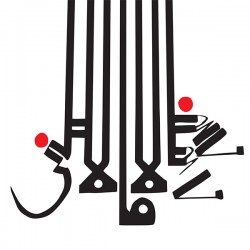 BY SEAN CALDWELL Ishmael Butler was once better known as Butterfly, who, along with Doodlebug and Ladybug, helmed the beloved jazz-inflected hip-hop trio Digable Planets, who were among the select few hip-hop outfits offering a credible alternative to the bitches-bullets-and-bling ethos of then-ascendant gangsta rap. In 1993, the band released Reachin’ (A New Refutation of Time and Space), which spawned the group’s best known single, “Rebirth of the Slick (Cool Like Dat).” With its titular nod to Miles Davis and infectious blend of Kind Of Blue horns, crisp snare, descending upright bass and beatnik word-jazz, the single earned Digable Planets a Grammy in the Best Rap Performance by a Duo or Group category in 1994 and gold certification from the RIAA. The follow-up, Blowout Comb, failed to match the debut’s overwhelming acclaim and adulation. Citing the dreaded ‘creative differences,’ Digable Planets called it a career in 1995. In the 2000s, Digable Planets performed a series of reunion shows and the promise of a new album from the group seemed eminent. However, the reunion album never saw the light of day and the group is currently inactive.
BY SEAN CALDWELL Ishmael Butler was once better known as Butterfly, who, along with Doodlebug and Ladybug, helmed the beloved jazz-inflected hip-hop trio Digable Planets, who were among the select few hip-hop outfits offering a credible alternative to the bitches-bullets-and-bling ethos of then-ascendant gangsta rap. In 1993, the band released Reachin’ (A New Refutation of Time and Space), which spawned the group’s best known single, “Rebirth of the Slick (Cool Like Dat).” With its titular nod to Miles Davis and infectious blend of Kind Of Blue horns, crisp snare, descending upright bass and beatnik word-jazz, the single earned Digable Planets a Grammy in the Best Rap Performance by a Duo or Group category in 1994 and gold certification from the RIAA. The follow-up, Blowout Comb, failed to match the debut’s overwhelming acclaim and adulation. Citing the dreaded ‘creative differences,’ Digable Planets called it a career in 1995. In the 2000s, Digable Planets performed a series of reunion shows and the promise of a new album from the group seemed eminent. However, the reunion album never saw the light of day and the group is currently inactive.
A Seattle based hip-hop group known as Shabazz Palaces emerged in 2010 via the release of two mysterious EPs, one self-titled and the other named, Of Light. While Shabazz Palaces was something of an enigma initially, it eventually came to light it was the work of Butler, who was now going by the name Palaceer Lazaro, and instrumentalist Tendai Maraire, who is the offspring of Zimbabwean mbira player, Dumisani Maraire. This being Seattle, the EPs soon reached the ears of Sub Pop, who made Shabazz Palaces their first ever rap signing, releasing Black Up, the group’s debut album, in 2011. Black Up earned widespread praise for its woozy blend of cannabanoidal sonics, pan-African mysticism and Koranic trappings. Shabazz Palaces released its follow-up, Lese Majesty, late last month and is currently in the midst of a supporting tour that will stop at Union Transfer on Friday. Last week we got Palaceer Lazaro/Ishmael Butler on the phone to talk dope, Islam, Sun Ra, sci-fi, Betty Shabazz, LSD, Moby Dick, Octavia Butler and the non-existent future of Digable Planets.
PHAWKER: How do your pronounce your current stage name? Is it Palaceer Lazaro (“Pal-ah-seer Luh-zar-o”)? Is that how you pronounce that?
ISHMAEL BUTLER: That’s it. Yes.
PHAWKER: It’s a cool name. Is that invented, or does that come from something?
ISHMAEL BUTLER:Well, the invention—I kind of want to keep a secret—but I got it out of one of my favorite book and it’s a take on the name of the main character. My real name, Ishmael, is also from a main character of a book called Moby Dick so…
PHAWKER: That is who you’re named after?
ISHMAEL BUTLER: I kind of got that literary pedigree from my Dad and Mom.
PHAWKER: Tell me how you pronounce the title of the new album —is it Leez Majesty?
ISHMAEL BUTLER:Yeah, you can say it with a French accent if you’ve got one, y’know, but that’s how I say it because I don’t have that French accent.
PHAWKER: It’s a beautiful phrase. Essentially it means: “offending royalty” or in the broadest sense treason. Why did you decide to call the new album Lese Majesty?
ISHMAEL BUTLER: ‘Cause, it’s like a lot of people are claiming royalty in the music business. And, we wanted to offend them a little, y’know come at that whole “I’m the greatest,” “I’m the best,” “Look at me,” “Pay attention to me,” “I’m doin’ this,” “I’m wearin’ that,” “I’m drivin’ this,” “I’m doin’ that,” like… Basically, man, get out of here with all that bullshit. I’m mean, like, it’s cool for the young kids because, I get it, you’re still finding your way through the world. But these older, more experienced kind of artists, are still popping this little kid stuff. It just seems ridiculous. I know that they’re just trying to get money and stay famous and ‘relevant,’ if you can call it that, but it just seems to push the influence of the coming generations into a direction that isn’t really going anywhere. It’s not good for anyone other than the person reaping the benefits. It’s just a very corporate outlook on something that I feel is sacred, which is music.
PHAWKER: Let’s talk about the band name for a second: Shabazz Palaces. That’s derived from Nation of Islam doctrine, an ancient scientist that led the Tribe of Shabazz from Mecca to Africa. Correct? Do I have that right?
ISHMAEL BUTLER: Yes.
PHAWKER: Do you consider yourself a Muslim or an adherent of Nation of Islam, or are you just drawing inspiration from the doctrines and aesthetics of those belief systems?
ISHMAEL BUTLER: Do I believe in those belief system? No. No, I don’t. And, that’s with all due respect to it. I feel that it’s cool also to… In any religious belief system, the stories that come out of it involve human beings, and those human beings’ stories and their actions, whether they’re true or allegorical or myths, makes you relate to ALL human beings. So, I draw from it the story, and what happened, and what people did and the idea and the actions that came of it. So, while I’m not Muslim, I did draw from that to come up with the name and have that represent abstractly what the music, and our presentation of it, was kind of all about, or at least evoke some thought that was related to that, y’know?
 PHAWKER: What impact has Sun Ra’s afro-futurist cosmology had on your lyrical outlook, or your philosophical outlook?
PHAWKER: What impact has Sun Ra’s afro-futurist cosmology had on your lyrical outlook, or your philosophical outlook?
ISHMAEL BUTLER: Not much. I mean I don’t know them that much. I did read his autobiography, which the most the influential thing that I got from that was, in his early years in Alabama, he was a prodigy really, and what that showed me was that he was a composer of the highest order. I mean, a Duke Ellington-type cat, y’know?—writing-parts-for-everybody-in-the-band type thing. So I didn’t really study his philosophy, I don’t really know what he said. A lot of the stuff that he was saying was hard for me to follow, or relate to. But, what I did get more than anything was his music, man: his rhythm, his sense of melody and harmony. I’m not really that cerebral. I do read, I enjoy reading, but I rarely read non-fiction stuff. I usually read fiction, science fiction and things like that. So, philosophically, I’m not that indebted, but Sun Ra means a lot to me musically, man.
PHAWKER: Is science fiction important to your lyrical outlook, or the philosophy of the band?
ISHMAEL BUTLER: It is, but not more important than the things my mother said to me when I was 7-8 years old, or the relationship that I’ve had with my girl, or something like that. It’s all intertwined to me, I’m not able to compartmentalize my influences and have one weigh more than another.
PHAWKER: Do you have favorite sci-fi writers you can mention?
ISHMAEL BUTLER: Yeah, but I feel like I don’t want to get pigeon-holed, you know what I’m saying? I mean, yeah, I do. I love Octavia Butler. I like Isaac Asmiov. I’ve read all the Richard Morgan books, as well. Octavia Butler is my main favorite, though, but I really like Richard Morgan’s stuff, too.
PHAWKER: The music of Shabazz Palaces is very trippy, very psychedelic. I’m wondering what, if any, impact drug use or psychedelics has on the creativity of the band. Now, or in the past.
ISHMAEL BUTLER: I mean it’s not like Pink Floyd’ish where we gotta rely on that to get it going, but it’s like… I mean we don’t really do too much other than smoke weed, truth be told. You can get your hands on some ‘shrooms or something, or a drop of acid every once in a while, but that’s kind of like Christmas, man—that don’t really come along that much. And we definitely aren’t in pursuit of it in order to achieve our musical ideas. Playing music and being in the studio in an inebriated and transcendental state of mind is foolish usually, anyway, so, yeah—not much, but we’ve been there. Definitely.
PHAWKER: How long did you guys take making Lese Majesty?
ISHMAEL BUTLER: Well, I contend that I’m always in a constant state of composition. And, when you record for a label and you know you got a record coming up, whether you’re specifically composing for that record or not, it doesn’t matter: you are. Every live show, every bit of spontaneity, every bit of practicing, every bit of rehearsal goes into what the final product of the album is because you gotta think: we might sketch out something out of soundcheck that, six months later when we’re back at home finally, got some time to settle down, we’ll bring it up, we’ll play it, we’ll add something to it, we’ll totally transform it into something else and that becomes a different part of another song. That’s kind of how it is. But, we dedicated the time to finishing it and the end zone kind of dance probably was about two and a half months.
ISHMAEL BUTLER: How would you characterize the difference between the new album and the album prior to it? I guess specifically in terms of tempo, but also in the arrangements. Maybe you could talk a little bit about the arranging it into a series of suites as well?
ISHMAEL BUTLER: Truth be told, brother, I never contemplated anything about the first record or this one really. I mean, for me the differences are so pronounced that I don’t even see any similarities. But, I understand when  people do. And, I understand when people are able to be talented enough observers to kinda differentiate between the two. But, I myself haven’t thought about that. So many years went by, I mean you gotta think: an album’s usually finished a year before anybody else ever hears it. So, that’s 2011, now we’re in 2014, I mean that’s just a distant memory, man, there’s so much things has happened in between musically that it’s really hard for me to go back and think of any in any real kind of way.
people do. And, I understand when people are able to be talented enough observers to kinda differentiate between the two. But, I myself haven’t thought about that. So many years went by, I mean you gotta think: an album’s usually finished a year before anybody else ever hears it. So, that’s 2011, now we’re in 2014, I mean that’s just a distant memory, man, there’s so much things has happened in between musically that it’s really hard for me to go back and think of any in any real kind of way.
PHAWKER: One last question, going back to Digable Planets for a second, back when the band was reactivated there was talk of a single, “Fresh Out,” and an album that was to come out in 2010. Neither of them ever materialized and then the band seemed to stop and sort of go back to being inert. Can you explain what’s going on with that? Will that music ever come out? And, is Digable Planets done and over for good?
ISHMAEL BUTLER: Yes.
PHAWKER: Will that music ever come out that I mentioned?
ISHMAEL BUTLER: No.
PHAWKER: Alright, well, that has a pretty definitive air of finality. Sorry to hear it but I respect you for wanting to move forward and not live in the past.
ISHMAEL BUTLER: Yeah, I appreciate that, man. I mean, we wanted to do that, especially me and Doodlebug were really keen on that, but Ladybug just didn’t really want to do it, didn’t have any passion for it so that’s how that fell by the wayside
PHAWKER: Okay, very good. Well, listen, man, I wish you luck with Shabazz Palaces and moving forward and thanks for taking the time to speak with us. See you when you get here in Philly.
ISHMAEL BUTLER: Alright, man. I appreciate your time, bro. Thank you.
SHABAZZ PALACES PLAYS UNION TRANSFER FRIDAY AUGUST 22nd
Sean Caldwell blogs @ Letters From A Tapehead

